 Petzlover
Petzlover Bully Kutta is originated from India but Schnorkie is originated from United States. Bully Kutta may grow 59 cm / 24 inches higher than Schnorkie. Bully Kutta may weigh 84 kg / 186 pounds more than Schnorkie. Bully Kutta may live 3 years less than Schnorkie. Both Bully Kutta and Schnorkie has same litter size. Bully Kutta requires Low Maintenance. But Schnorkie requires Moderate Maintenance
Bully Kutta is originated from India but Schnorkie is originated from United States. Bully Kutta may grow 59 cm / 24 inches higher than Schnorkie. Bully Kutta may weigh 84 kg / 186 pounds more than Schnorkie. Bully Kutta may live 3 years less than Schnorkie. Both Bully Kutta and Schnorkie has same litter size. Bully Kutta requires Low Maintenance. But Schnorkie requires Moderate Maintenance
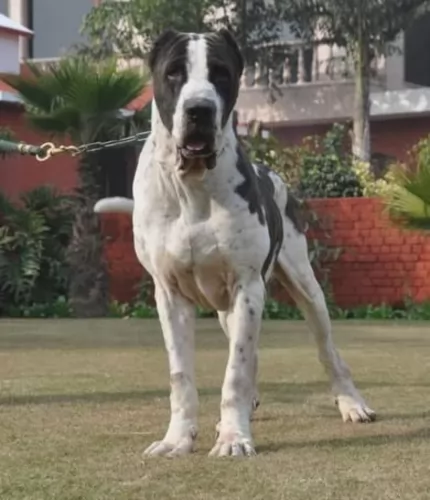 This well built, powerful dog breed is also known as Indian Alangu Mastiff or Pakistani Mastiff. These dogs come from the Punjab and Sindh region of the Indian subcontinent. It is believed that mastiff dogs came with British soldiers during the British invasion, however English Mastiffs, Bulldogs, Bull Terriers and Great Danes are seen as potential ancestors of this large dog.
This well built, powerful dog breed is also known as Indian Alangu Mastiff or Pakistani Mastiff. These dogs come from the Punjab and Sindh region of the Indian subcontinent. It is believed that mastiff dogs came with British soldiers during the British invasion, however English Mastiffs, Bulldogs, Bull Terriers and Great Danes are seen as potential ancestors of this large dog.
There are disputes about the country of origin of this breed, and some people claim that the dog comes from India, while others say it comes from Pakistan. Certainly in Pakistan these dogs are still used for fighting.
 This dog is a cross between the Miniature Schnauzer and the Yorkshire Terrier.
This dog is a cross between the Miniature Schnauzer and the Yorkshire Terrier.
It’s not a purebred dog and is known as a designer dog. These dogs inherit characteristics from both of its purebred parents.
The origins and history of these breeds is often unknown with their being no records as to when or where breeders started developing them. This particular mixed breed dog originated in the United States.
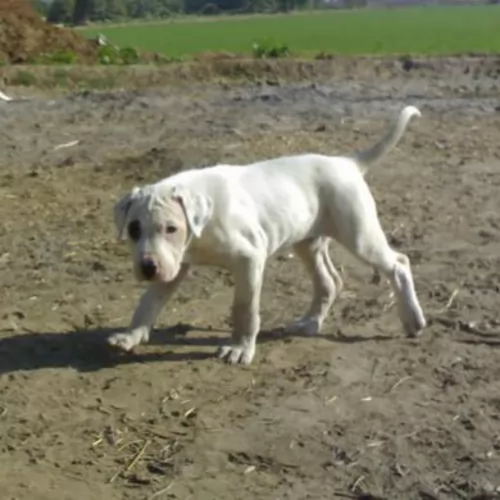 The Bully Kutta is a big, heavy, muscular dog, standing at roughly 81 – 89cm and weighing in at 70–90kg. He isn’t particularly good with children or with other pets simply because the dog is aggressive by nature. If you do opt for this large breed, you’re going to need a large garden and he is going to require a lot of exercise.
The Bully Kutta is a big, heavy, muscular dog, standing at roughly 81 – 89cm and weighing in at 70–90kg. He isn’t particularly good with children or with other pets simply because the dog is aggressive by nature. If you do opt for this large breed, you’re going to need a large garden and he is going to require a lot of exercise.
This is a dog breed that is going to require socialization and training if you want him to be obedient and calm, as he is inclined to be a dominating breed. He’s an intelligent dog and when well trained, he makes a splendid pet with firm, fair owners.
The Bully Kutta has a large, broad head which is supported by a thick well-muscled neck. The skin around his lower jaw is loose. The ears are short, set high and are mostly cropped, but other times they are left to flop over. The tail is sometimes docked but these days mostly left long and tapered.
He has a short smooth coat and is essentially white in color although the coat can also be fawn, brown, black or brindle.
 The Schnorkie is a small dog standing at between 12 to 30cm in height and weighing just 3 to 6kg.
The Schnorkie is a small dog standing at between 12 to 30cm in height and weighing just 3 to 6kg.
Schnorkies have an athletic build but they are lean and you want to keep them that way.
Their double coat is mostly silky and straight, but can be wavy too. The double coat can be grey, silver, fawnish and have a mix of colors while also being available in solid colors.
The ears are half erect, half floppy and the tail tends to be medium length, plumed and held up.
Schnorkies are high spirited little dogs and they can also prove to stubborn. There is nothing that a bit of training and socialization won't do for stubborn dogs, making them obedient and responsive to their owners.
Because they are hybrid dogs, they can inherit temperaments or looks from either of the parent dogs.
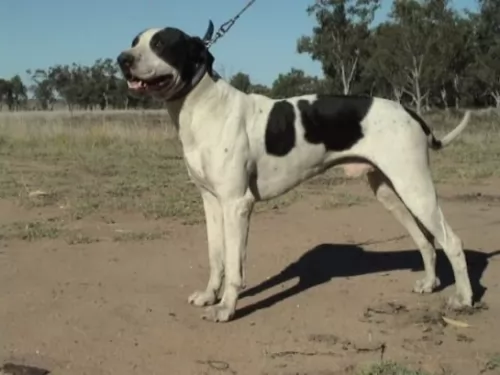 The Bully Kutta is a powerful, imposing dog and they have been nicknamed the ‘Beast from the East’. Unfortunately it is this dog’s thick bones, his looks and his strength that have him used for cruel dog fighting in Pakistan.
The Bully Kutta is a powerful, imposing dog and they have been nicknamed the ‘Beast from the East’. Unfortunately it is this dog’s thick bones, his looks and his strength that have him used for cruel dog fighting in Pakistan.
When not used for fighting, he makes a loyal, devoted companion for the owner who ensures proper socialization and training. Well raised Bully Kuttas are then good with children, being loving, protective and playful.
One just hopes that the future of this giant dog breed is brighter, and that he will be looked upon as more of a companion that just a dog-fighting object to bring in money for his owner.
 Your Schnorkie is a jaunty little dog who is going to love playing games with you. Children will need to treat him with gentleness and respect simply because he is small.
Your Schnorkie is a jaunty little dog who is going to love playing games with you. Children will need to treat him with gentleness and respect simply because he is small.
He is social, friendly and loving with his human family, though sometimes, coming from the Schnauzer, he gets a bit moody.
He makes a great family pet though and and while he loves to be outside playing, he also loves to come indoors and be everybody’s lap dog for the evening.
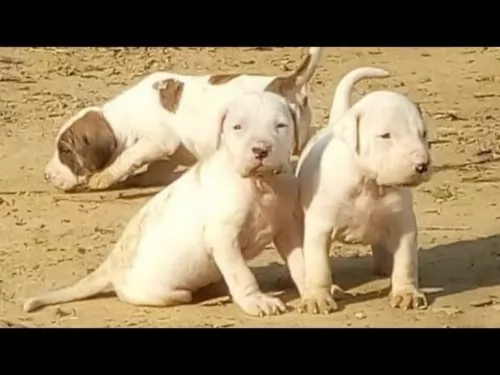 Your Bully Kutta is generally a healthy dog and not often affected by hereditary diseases, but with giant breeds such as this you will have to look out for diseases common to large dogs.
Your Bully Kutta is generally a healthy dog and not often affected by hereditary diseases, but with giant breeds such as this you will have to look out for diseases common to large dogs.
Typical illnesses to watch out for will include hip dysplasia, arthritis, skin allergies and bloat.
This is an inherited condition where the hip joint is improperly formed. For your Bully Kutta it causes wear and tear as well as stiffness in the hips and your dog battles to rise after lying down.
Arthritis in your dog can be managed but it can cause a lot of discomfort for him. This inflammation of the joints can cause pain and stiffness. It is more often seen in older dogs. It can also start at an early age because of problems with bone and joint development and abnormal rubbing within the joint.
Today there are a number of therapy options that can bring some kind of relief to your dog.
 Your Schnorkie, as a hybrid breed, can inherit some health problems from either parent – the Schnauzer or the Yorkshire Terrier.
Your Schnorkie, as a hybrid breed, can inherit some health problems from either parent – the Schnauzer or the Yorkshire Terrier.
Then again, mixing pure bred dogs can eliminate some common dog ailments. Overall, the Schnorkie is a healthy dog and can live up to 15 years of age.
A couple of major health concerns with the Schnorkie are dental problems and pancreatitis.
If your dog has tooth problems he might be in terrible pain and that is why it is so important to look inside his mouth.
Dogs can break their teeth and they can also get gum disease. Dogs have a more alkaline mouth and this is what encourages plaque. Try and brush your pet’s teeth with special canine toothpaste and toothbrush because dental disease can cause lots of problems for your pet.
The pancreas helps with the digestion of food and to regulate blood sugar. Pancreatitis is more common in Schnauzers, and then the pancreas is swollen and inflamed.
Dogs with this disease will lose their appetite, be lethargic, restless and have stomach pain. You may see your pet hunching his back. Pancreatitis can lead to organ damage and you will need to get your dog to the vet.
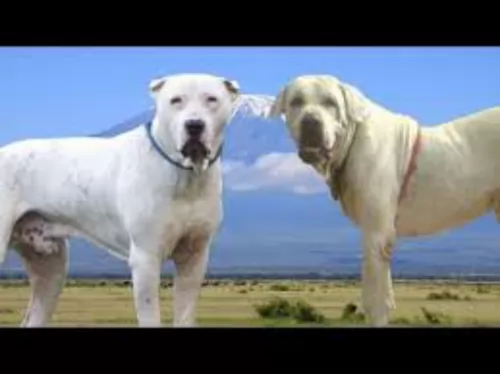 The short coat is low maintenance and as a moderate shedder too, all that is required really is to give your Bully Kutta a good brush twice a week to keep the coat in good condition.
The short coat is low maintenance and as a moderate shedder too, all that is required really is to give your Bully Kutta a good brush twice a week to keep the coat in good condition.
Brush his teeth 2 or 3 times a week with special canine-toothpaste and toothbrush to prevent plaque build-up. He’s a drooler too, so you will need to wipe his face and maybe your clothes of slobber from time to time.
This strong, muscular dog of yours will require an excellent diet. It’s always wonderful if you can give him home-made food such as vegetables, rice and meat. These days you get excellent commercially manufactured food for dogs, and your vet can advise you on the best food for a large, active dog such as the Buly Kutta.
Raw meat is absolutely essential for your dog from time to time and will ensure that his coat doesn’t become dull and with bald spots. Remember, that before dogs were domesticated they used to live on raw meat, so see that he gets some raw meat to prevent skin disorders. Make sure your large pet has a constant supply of fresh, cool water.
Bully Kuttas are going to need a walk every day in the form of exercise. If he is socialized you can take him into the park for ball games. He is a dog that will require plenty of space.
 Puppies will need 4 small meals a day, but by 8 weeks your Schnorkie will be ready to move onto dry dog food. As he grows into an adult you will cut the meals down to two a day.
Puppies will need 4 small meals a day, but by 8 weeks your Schnorkie will be ready to move onto dry dog food. As he grows into an adult you will cut the meals down to two a day.
The best commercially manufactured dry dog food is able to meet your dogs nutritional needs and it’s super convenient too. It can be a good idea to feed your pet some home-made food too. Twice a week will be sufficient to add in this home-made food - boiled chicken, brown rice or pasta, sweet potatoes, carrots and spinach will be excellent for him and his digestion and be a tasty treat for him. You can simply chop it up and add it to the dry kibble. Some raw meat occasionally can help to ward off nasty skin ailments. Make sure that your Schnorkie has a constant supply of cool fresh water.
Schnauzers and Yorkies both have high maintenance coats and your Schnorkie will also require regular brushing, though he doesn’t shed much. Some people prefer to hand their dogs in and have them professionally groomed.
Just because a Schnorkie is a little dog, doesn’t mean he doesn’t need exercise. You don’t want a small dog like this getting obese and unfit. Take him for walks and give him some ball games.